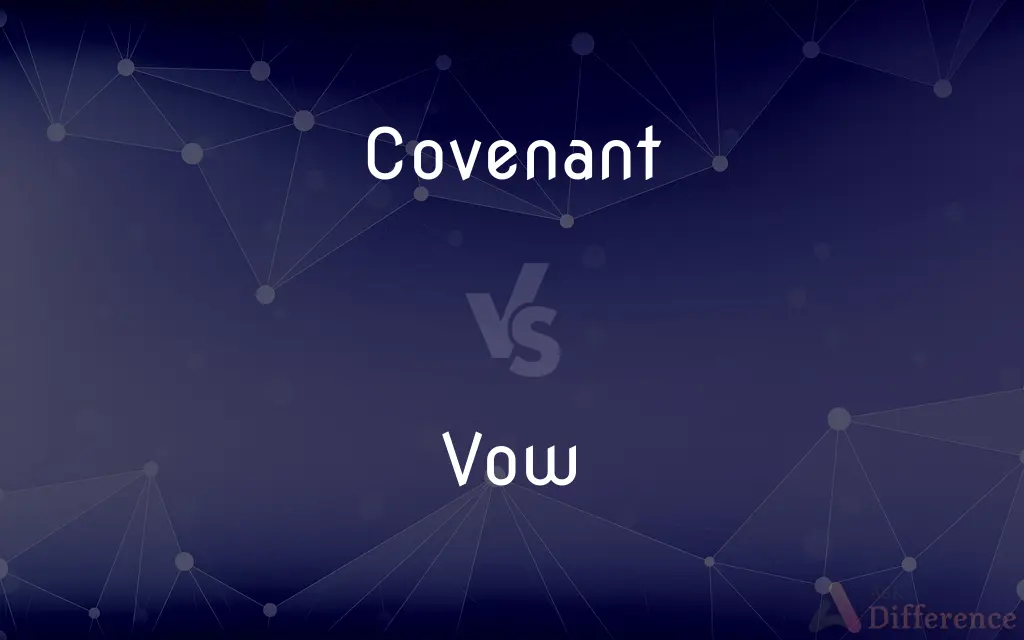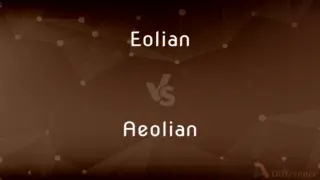Covenant vs. Vow — What's the Difference?
Edited by Tayyaba Rehman — By Maham Liaqat — Updated on March 11, 2024
A covenant is a formal, mutual agreement between parties with specific commitments, while a vow is a solemn promise made by an individual, often to a deity.

Difference Between Covenant and Vow
Table of Contents
ADVERTISEMENT
Key Differences
A covenant represents a formal agreement or contract between two or more parties, typically involving mutual obligations or commitments. It is often used in legal, religious, and social contexts, indicating a binding relationship with defined responsibilities and benefits for all involved. On the other hand, a vow is a solemn promise or pledge, usually made by an individual, that signifies a deep commitment to perform an act, refrain from doing something, or uphold a principle or relationship, often in a religious or spiritual context.
Covenants are characterized by their bilateral or multilateral nature, meaning they require the consent and participation of all parties involved. These agreements can be seen in various aspects of life, including marriages (marital covenants), international treaties, and business contracts, each party promising to fulfill certain roles or actions. Vows, however, are unilateral, originating from a single individual's intention and dedication, such as vows of celibacy, poverty, and obedience taken by members of certain religious orders, or personal vows made in wedding ceremonies.
In religious texts, such as the Bible, covenants hold significant importance as divine agreements between God and His people, encompassing promises and stipulations set forth by God, with people agreeing to follow His laws in return for blessings or protection. Vows in religious contexts are often personal commitments to God, reflecting an individual's devotion and spiritual ambition, such as the Nazirite vow in Christianity or vows made during religious rites and ceremonies.
The establishment of a covenant often involves formal ceremonies or rituals to signify the agreement's importance and the parties' commitment. These might include signing documents, exchanging rings, or other symbolic acts. Conversely, vows may be made in private or public settings, requiring no formal ceremony but rather a personal or public declaration of intent and purpose.
Covenants can be enforceable agreements, subject to laws and regulations, ensuring that parties fulfill their obligations. Breach of a covenant may lead to legal consequences or the dissolution of the agreement. Vows, while deeply personal and morally binding, often lack legal enforceability unless they form part of a contractual agreement or recognized institution, such as marriage.
ADVERTISEMENT
Comparison Chart
Nature
Formal agreement between parties with mutual obligations.
Solemn promise by an individual, often religious.
Parties Involved
Bilateral or multilateral.
Unilateral.
Contexts
Legal, religious, social.
Religious, personal.
Examples
Marital covenants, international treaties, business contracts.
Vows of celibacy, poverty, obedience, wedding vows.
Enforcement
Legally enforceable, with possible legal consequences for breach.
Morally binding, usually not legally enforceable.
Compare with Definitions
Covenant
Involves specific commitments and benefits.
The marriage covenant includes promises of fidelity and support.
Vow
A solemn promise made by an individual.
A vow of silence taken for spiritual purification.
Covenant
Legally enforceable, subject to laws and regulations.
Breaching a business contract can result in legal penalties.
Vow
Reflects a deep commitment or principle.
Wedding vows express commitment to love and cherish.
Covenant
Found in legal, religious, and social contexts.
Biblical covenants signify divine promises and human responsibilities.
Vow
Can be made privately or publicly, without formal ceremony.
Personal vows made in prayer or during meditation.
Covenant
Often established through ceremonies or rituals.
Signing a contract or exchanging rings as symbols of covenant.
Vow
Morally binding, often without legal enforceability.
Personal vows guide behavior but lack legal implications.
Covenant
A formal, mutual agreement between parties.
The covenant between nations aimed to promote peace.
Vow
Predominantly personal or religious in nature.
Religious vows of poverty demonstrate devotion to spiritual life.
Covenant
A binding agreement; a compact.
Vow
A vow (Lat. votum, vow, promise; see vote) is a promise or oath.
Covenant
A condition in a contract such as a deed or lease, nonperformance or violation of which gives rise to a cause of action for breach.
Vow
An earnest promise to perform a specified act or behave in a certain manner, especially a solemn promise to live and act in accordance with the rules of a religious order
Take the vows of a nun.
Covenant
A contract.
Vow
To promise solemnly; pledge.
Covenant
In the Bible, a divine promise establishing or modifying God's relationship to humanity or to a particular group.
Vow
To make a pledge or threat to undertake
Vowing revenge on their persecutors.
Covenant
One of the agreements supported by a Covenanter.
Vow
To make a vow; promise.
Covenant
To promise by a covenant.
Vow
To declare or assert
"Well, I vow it is as fine a boy as ever was seen!" (Henry Fielding).
Covenant
To enter into a covenant.
Vow
A solemn promise to perform some act, or behave in a specified manner, especially a promise to live and act in accordance with the rules of a religious order.
The old hermit, up in the mountains, took a vow of silence.
Covenant
(legal) An agreement to do or not do a particular thing.
Vow
A declaration or assertion.
Covenant
(legal) A promise, incidental to a deed or contract, either express or implied.
Vow
(obsolete) A votive offering.
Covenant
A pact or binding agreement between two or more parties.
Vow
(ambitransitive) To make a vow; to promise.
Covenant
An incidental clause in an agreement.
Vow
(transitive) To make a vow regarding (something).
The wronged woman vowed revenge.
Covenant
To enter into, or promise something by, a covenant.
Vow
To declare publicly that one has made a vow, usually to show one's determination or to announce an act of retaliation.
The rebels vowed to continue their fight.
Covenant
(legal) To enter a formal agreement.
Vow
A solemn promise made to God, or to some deity; an act by which one consecrates or devotes himself, absolutely or conditionally, wholly or in part, for a longer or shorter time, to some act, service, or condition; a devotion of one's possessions; as, a baptismal vow; a vow of poverty.
I pray thee, let me go and pay my vow.
I am combined by a sacred vow.
Covenant
(legal) To bind oneself in contract.
Vow
Specifically, a promise of fidelity; a pledge of love or affection; as, the marriage vow.
Knights of love, who never broke their vow;Firm to their plighted faith.
Covenant
(legal) To make a stipulation.
Vow
To give, consecrate, or dedicate to God, or to some deity, by a solemn promise; to devote; to promise solemnly.
[Men] that vow a long and weary pilgrimage.
Covenant
A mutual agreement of two or more persons or parties, or one of the stipulations in such an agreement.
Then Jonathan and David made a covenant.
Let there be covenants drawn between us.
If we conclude a peace,It shall be with such strict and severe covenantsAs little shall the Frenchmen gain thereby.
Vow
To assert solemnly; to asseverate.
Covenant
An agreement made by the Scottish Parliament in 1638, and by the English Parliament in 1643, to preserve the reformed religion in Scotland, and to extirpate popery and prelacy; - usually called the "Solemn League and Covenant."
He [Wharton] was born in the days of the Covenant, and was the heir of a covenanted house.
Vow
To make a vow, or solemn promise.
Better is it that thou shouldest not vow, than that thou shouldest vow and not pay.
Covenant
The promises of God as revealed in the Scriptures, conditioned on certain terms on the part of man, as obedience, repentance, faith, etc.
I will establish my covenant between me and thee and thy seed after thee in their generations for an everlasting covenant, to be a God unto thee, and to thy seed after thee.
Vow
A solemn pledge (to oneself or to another or to a deity) to do something or to behave in a certain manner;
They took vows of poverty
Covenant
A solemn compact between members of a church to maintain its faith, discipline, etc.
Vow
Make a vow; promise;
He vowed never to drink alcohol again
Covenant
An undertaking, on sufficient consideration, in writing and under seal, to do or to refrain from some act or thing; a contract; a stipulation; also, the document or writing containing the terms of agreement.
Vow
Dedicate to a deity by a vow
Covenant
To agree (with); to enter into a formal agreement; to bind one's self by contract; to make a stipulation.
Jupiter covenanted with him, that it should be hot or cold, wet or dry, . . . as the tenant should direct.
And they covenanted with him for thyrty pieces of silver.
Covenant
To grant or promise by covenant.
My covenant of peace that I covenanted with you.
Covenant
A signed written agreement between two or more parties (nations) to perform some action
Covenant
(Bible) an agreement between God and his people in which God makes certain promises and requires certain behavior from them in return
Covenant
Enter into a covenenant
Covenant
Enter into a covenant or formal agreement;
They covenanted with Judas for 30 pieces of silver
The nations covenanted to fight terrorism around the world
Common Curiosities
Are vows always religious?
While vows are commonly associated with religious contexts, they can also be personal pledges not tied to any religion.
What is a covenant?
A covenant is a formal, mutual agreement between two or more parties with specific commitments and obligations.
Can a covenant be legally enforced?
Yes, covenants are legally enforceable, with specific laws governing the consequences of breach.
What is an example of a covenant in the Bible?
The covenant between God and Abraham is an example, where God promises to make Abraham the father of many nations.
Can a person break a vow without consequences?
While breaking a vow may not always have legal consequences, it can carry moral or social repercussions, depending on the context.
What is the significance of ceremonies in establishing covenants?
Ceremonies symbolize the importance and mutual commitment of the parties involved in a covenant, marking the formalization of the agreement.
How does a vow differ from a covenant?
A vow is a solemn promise made by an individual, often in a religious context, reflecting deep commitment, unlike a covenant, which involves mutual agreements between parties.
Can a vow become a legal commitment?
Vows made in the context of recognized institutions, like marriage, can have legal implications, but personal vows typically do not.
What makes a vow unilateral?
A vow is considered unilateral because it originates from and is fulfilled by a single individual's commitment.
Are all covenants between humans and a deity?
Not all; covenants can also be between humans, such as marital covenants, or between nations, like treaties.
Share Your Discovery

Previous Comparison
Eolian vs. Aeolian
Next Comparison
Framework vs. StructureAuthor Spotlight
Written by
Maham LiaqatEdited by
Tayyaba RehmanTayyaba Rehman is a distinguished writer, currently serving as a primary contributor to askdifference.com. As a researcher in semantics and etymology, Tayyaba's passion for the complexity of languages and their distinctions has found a perfect home on the platform. Tayyaba delves into the intricacies of language, distinguishing between commonly confused words and phrases, thereby providing clarity for readers worldwide.
















































